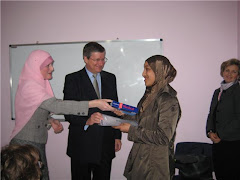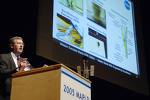
He began by highlighting the fact that tackling Australia’s drug problem is an ongoing fight.
Heroin from Thailand and cocaine from South America coupled with the country’s own perfect cannabis-growing climate and universally easy-to-make amphetamines means high availability of a variety of drugs. In fact, approximately, 85% of inmates in American and Australian prisons are there for drug-related crimes.
Why do people become addicts?
A couple of possibilities were discussed but the idea of an ‘addictive personality’ was refuted by Da’oud. He favoured the work of Alice Miller, a psychotherapist, who suggests that families are the main cause of substance abuse through engaging in child-rearing techniques which result in emotional, physical or sexual abuse of the child.
This abuse affects the self-esteem of the individual causing denial and for some, this denial manifests itself in an addictive process which is a dangerous combination.
The result of this combination may show itself in a variety of ways depending on the person’s personality type. Some individuals may develop obsessive compulsive behaviours and become all-consumed in work or a passion of theirs such as music, art or sports and may indeed excel in their field. Others may turn to drugs or self-harm.
However, neither is healthy as they both keep the individual from facing the truth about themselves.
As Da’oud believes that humans have an inbuilt need to seek the truth, drug addicts will always be restless and reliant on their drug until they deal with the denial.
He also suggested that some nations have been drinking alcohol for centuries and therefore their people have genetically adapted to it but that for some nations who are only recently being exposed to it, such as the indigenous Aborigines and the Black African Americans, it can cause real problems.
How are drug addicts rehabilitated?
In general, rehabilitation has two main steps:
1. Medically detoxify the patient – a controlled gradual reduction of the drug they usually take or synthetic replacement to enable the body to adapt to the withdrawal process to a point where they are drug-free.
2. Outpatient or residential programmes – these are aimed at removing the individual from the addiction long enough to help them identify the underlying issue and its effects and help develop strategies to deal with that issue.
There are a number of ways that friends and family can also help.
Da’oud highlighted the importance of telling addicts the truth by using expressions such as, ‘I hate seeing you deteriorate in this way’. This should be coupled with action. Relatives and friends often act as a ‘prop’ to their loved ones, bailing them out of jail, giving them money and trying to reduce the harm they cause themselves. However, it was suggested that the following, ‘ABC’ method should be used to help break the cycle:
A = Antecedent
B = Behaviour
C = Consequence
By experiencing the consequence, the addict can see the result of their behaviour and this in turn may prompt them to seek out the cause.
What Next?
One of the difficulties following rehabilitation is being discharged back into an environment which encourages the previous behaviour which is often the case in developed countries where enjoying yourself, by definition, involves taking one form of drug or another.
People work very hard with high stress levels and are looking for a quick way to relax. Alcohol and cigarettes had, in the past, been widely advertised on TV and at sporting events and the fact that they were legal helped them become a social norm amongst a majority of the population.
Interesting, in the UK, the smoking ban in public places (brought in to reduce the huge costs spent by the government each year through the NHS on the treatment of smoking related diseases), has made smokers feel like social lepers. However, alcohol remains an acceptable social lubricant for all occasions despite its position on Da’oud’s ‘Addictive drugs harmful effects’ ladder.
This may be why the term ‘drugs and alcohol’ is slowly being replaced by the term ‘alcohol and other drugs’ as a reminder as to its addictive nature.
Da’oud’s ‘Harmful effects of addictive drugs’ ladder:
Barbituates
Alcohol
Amphetamines These stimulate the nervous system making the user feel energetic and reducing the need for sleep or food.
Nicotine Smoking related diseases are the most common cause of death in some countries.
Cocaine
Cannabis Long term use can cause psychosis, occasionally irreversible.
Methadone Used to ween addicts off of Heroin but potentially more harmful as a product.
Heroin Chemically closely resembles our own body’s endorphins (which provide pain relief). The body then stops producing its own endorphins so withdrawal from Heroin can be both an emotionally and physically painful
process.
Caffeine
It may surprise readers to see Heroin so low down on this list where Barbituates are the most harmful and caffeine the least but the majority of deaths from Heroin are from a lack of regulation causing the drug on the street to be mixed with unknown additives and no guarantee of its strength.
The American Government made it a condition of joining the United Nations that Heroin should be illegal although the reason for this is unknown. Some believe that if it were made legal then deaths from its use would reduce.
It should be remembered that a majority of these drugs have the potential to trigger an underlying predisposition to psychiatric diseases and that sometimes, during withdrawal, a patient’s disease may become worse due to the fact that the drug was propping up that condition.
.JPG)

.JPG)


